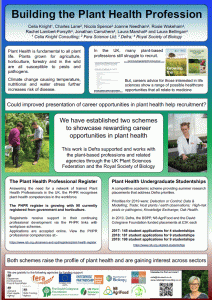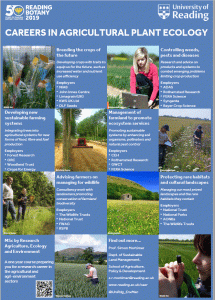Careers

What does a botanist do?
Well, there is a diverse range of careers with plants! UCAS provides useful advice and links to possible degrees that can help you decide what path is right for you if you are interested in working with plants. Some of the ideas provided below also offer guidance on what training is required, but our main aim here is to showcase the range of opportunities available. We are adding to this page all the time…… so keep checking back!
General advice
Royal Society of Biology: for resources for teachers and some career advice.
 Gatsby Plant Science pages: great resources to show the wide range of work that plant scientists do and the kinds of sectors where there is an important and growing skills market, such as in plant health (click here to view the ‘Building the Plant Health Profession’ poster).
Gatsby Plant Science pages: great resources to show the wide range of work that plant scientists do and the kinds of sectors where there is an important and growing skills market, such as in plant health (click here to view the ‘Building the Plant Health Profession’ poster).
Also under the Gatsby umbrella is the Into Biology website which provides useful information to support UK biology students aged between 17 and 21, with science news, some careers guidance, and study skills support.

Where Can Ecology Take You? : this leaflet provides general guidance developed jointly by the British Ecological Society and CIEEM (Chartered Institute of Ecology and Environmental Management), on ecological careers in a variety of sectors including: scientific research; conservation and environmental management; policy; science education (in field study centres, wildlife trusts, museums etc); ecological consultancies; environmental services (for government bodies, National Parks, local planning authorities, etc); and, science communication (museums, publishing, universities, television, etc.).
BSBI (Botanical Society of Britain and Ireland): this organisation provides suggestions and training opportunities to help develop a career with plants in the UK.
Field Studies Council : run field courses in both the sciences and the arts to help develop skills and professional development for careers in the environment.
The horticultural industry is a big employer of people who love working with plants. There is so much more to it than just working as a gardener and landscape designer. The Chartered Institute of Horticulture provides advice through their ‘Grow Careers’ pages which demonstrate opportunities and skills gaps within this industry. The RHS (Royal Horticultural Society) also offers guidance and examples of who they employ such as gardening specialists, horticultural taxonomists, plant health specialists (entomology and pathology), plant science, horticultural advisers and information specialists.
The Society of Chemical Industry Horticultural Group works to promote links between chemistry-related science and industry for the benefit of society, as shown in their poster on the importance of horticulture and plant science for a sustainable future.
A major horticultural skills survey of more than 1,100 horticulture-related businesses took place between April and June 2019 in a study commissioned by the Ornamental Horticulture Roundtable Group. This has shown that environmental factors are the main driver for change in the future of the ornamental plant sector; and, a shortage of skills and access to labour followed environmental issues as the other top drivers for change.

Careers in agricultural plant ecology: this poster from Professor Simon Mortimer shows the multitude of different careers available in the agricultural and agri-environment sector from breeding the crops of the future, developing new sustainable farming systems, management of farmland to promote ecosystem services and helping farmers manage for wildlife to protecting rare habitats and cultural landscapes.
Career Scenarios
- Forensic botanist, curator, plant scientist: Dr. Mark Spencer; and,
- Working as a plant ecologist at CEH (Centre for Ecology and Hydrology) “Aiding the understanding, prediction and mitigation of threats to UK biodiversity” (poster created by Markus Wagner, Oli Pescott & Lucy Ridding for the Big Botany Challenge! Symposium 2019).
More stories to come! Watch this space…….
